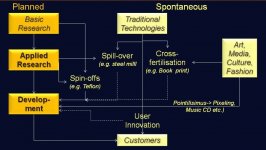That's right. Monasteries were the places where the financial capital was in medieval time period (they were the biggest land owners), therefore no wonder that many inventions took place there. Most inventions today also come form a place where the most financial capital is, mainly USA and other developed countries.
Innovation theory distinguishes between invention itself, and the innovation process:
"Innovation is the ability to take new ideas and translate them into commercial outcomes by using new processes, products or services in a way that is better and faster than the competition."
Reviewing Community innovation policy in a changing world, EU Commission 02/2009, p.1
The
invention (generation of a technical idea) can come from several sources: Planned research, traditional technology, art & culture, etc. Quite often, especially in historical periods, it stems from a combination of several of these sources (see attached diagram).
Spill-over means the application of a traditional technology to a new field (e.g. steel mills). A famous example of
cross-fertilisation is the printing press, whereby the monasterial tradition of stamping individual letters was combined with the traditional wine pressing technology.

But, as Angela points out correctly, the idea itself does not mean it will become an
innovation, i.e. regularly be put in use by others. Three further steps are required here:
- Absortion: Other people learn of the idea/ invention, and recognise it as potentially valuable;
- Adoption: The idea is developed technically to a point where it actually works and demonstrates its benefits to specific needs - here, capital comes in play.
- Diffusion: The new technology is not only used once and/or by a specific person/ group, but spread around so its application becomes regular and widespread.
The strong role of monastries for medieval innovation goes far beyond them having
capital to mature ideas to technological adoption. They were first of all the
centres of research, maintaining libraries that included the works of antique authors and also (some) Arab scholars. They formed a
network of exchange, by copying books and providing it to other monasteries (a process that typically involved monks from one monastery temporarily staying in another one). Being strongly involved in production, they had both the impetus and the possibility to
test and develop technologies on site. Finally, monastery schools, but also demonstration on their own premises, provided for effective
dissemination to nearby villages and towns.
Against that background, one may question whether the fact that many of Leonardo da Vinci's inventions remained unnoticed is just due to "the time not being ripe for it". Possibly, he worked for the wrong institutions, namely North Italian nobles instead of medieval monasteries. These nobles lacked several features such as being part of a research network, being directly involved in production, and having an interest in and means for innovation dissemination.
Culture is a key issue as well. I am not talking of "culture as a whole", but of an "innovation culture", a general appreciation of new, potentially revolutionary ideas, or, in Aberdeen's words, "a progressive and forward looking attitude". It is noteworthy that the inventor of the mechanical clock, one of the most renowned scientists of his times (he also promoted the use of Arab numbers and was a noted astronomer) became Pope - something almost unthinkable in the 15th/16th century.
How come Pope Sylvester II, a French national and Abbot in Reims and Bobbio, installed the first mechanical clock in Magdeburg? Magdeburg has been one of the top five German medieval cities (alongside Cologne, Lübeck, Erfurt and Nuremberg), but there were many other equally rich or richer cities around Europe that could have asked for this technology but didn't. Six centuries later, there has been another case of a noted scientist becoming a political leader - Otto von Guericke, who discovered the vacuum, and was mayor of, -yes - Magdeburg. Local innovation culture, maintained over six centuries?
http://en.wikipedia.org/wiki/Pope_Sylvester_II
http://en.wikipedia.org/wiki/Otto_von_Guericke
http://en.wikipedia.org/wiki/Innovation_economics

